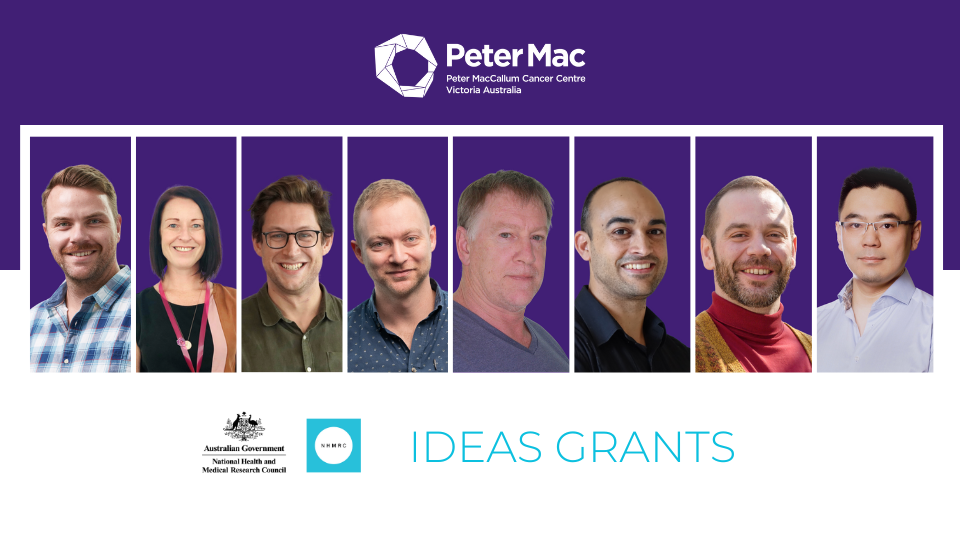Eight Peter Mac projects awarded 2023 NHMRC Ideas Grants
15 December 2023
Eight Peter Mac projects worth nearly $9 million in funding have been successfully awarded 2023 National Health and Medical Research Council (NHMRC) Ideas Grants.
The Ideas Grant scheme provides opportunities for early- and mid-career researchers and supports innovative research projects addressing a specific question/s.
Executive Director Cancer Research, Professor Ricky Johnstone, said it is a fantastic result for Peter Mac.
“It is pleasing to see eight exciting projects being funded for an amount of $8.7 million across laboratory and clinical research, which is an increase from last year,” he said.
“Kudos to all our researchers and professional services teams, especially the grants team, for their outstanding submissions to this highly competitive scheme. Sincere congratulations to those successful applicants whose grants will enable Peter Mac to continue our world-class, innovative research.”
Read more on each project below.

Harnessing the immune response in exceptionally long-term survivors of ovarian cancer to develop novel therapeutics
Dr Dale Garsed
Most people with high-grade serous ovarian cancer develop chemotherapy resistance and fail to benefit from today's immunotherapies. Nonetheless, a rare subset of patients experience exceptionally long-term survival, which Dr Garsed’s team recently showed is linked to the presence of tumour-infiltrating B cells (specialised immune cells that produce anti-tumour antibodies). This project will characterise the antibodies associated with exceptional survival and evaluate their use as new therapeutic agents to target ovarian cancer cells.
mRNA processing in development and disease
Dr William Hamilton
The complement of genes which are active in any specific cell determines how that cell will behave. This is highly dynamic and tightly regulated during embryonic development but often altered in cancer. Dr Hamilton has identified a novel pathway, active in the early embryo but also reactivated in some cancers, which alters how the mRNA encoded by genes is regulated and as such regulates gene expression. This research will uncover fundamental principles of gene expression and help explain why its deregulation underpins some cancers.
Mechanisms to promote lymphatic vessel growth in tissue repair and disease
Professor Ben Hogan
Lymphatic vessels drain tissue fluids and traffic immune cells. Recent studies discovered that promoting lymphatic vessel growth improves outcomes in cardiovascular disease, cancer and lymphoedema. A clinical need exists to be able to promote the formation of functional lymphatic vessel networks in patients. Using model organism genetics, cell and developmental biology, this project will characterise mechanisms and methods to promote robust lymphatic formation. Outcomes will inform future therapeutic approaches in lymphoedema and diverse clinical settings.
Exploring the role for CD4+ T cells in CAR-T cell efficacy against solid tumours
Professor Paul Neeson
Patients with advanced treatment resistant cancer have few therapy options and have a poor clinical outcome. Chimeric antigen receptor (CAR) T-cells are a potential therapy for cancer patients, so far patients with advanced solid tumours have responded poorly. This project will fix this problem by addressing three distinct issues: poor CAR T-cell persistence in the patient; tumour inhibition of CAR T-cell function; and the CD4+ T-cells used to produce CAR T-cells for cancer patients.
Targeting a novel T cell differentiation state for more effective cancer immunotherapy
Dr Ian Parish
Immunotherapies are a revolutionary approach for cancer treatment, but most people with cancer do not respond. Dr Parish has identified a previously unknown process that shuts down anti-cancer immune function and limits responsiveness to existing immunotherapies. This project will pioneer new therapeutic strategies to disrupt this process in immunotherapy-resistant tumours, and identify the people with cancer who would best benefit from this treatment approach.
Investigating transcript diversity as a driver of therapy-induced plasticity in melanoma
Dr Lorey Smith
Cancer cells have a remarkable ability to change their physical characteristics, which is known to allow their spread around the body, ability to resist therapies and to return post-treatment. This plasticity and ability to adapt contributes to therapeutic resistance and limits outcomes for patients. In this project we will use a rapidly evolving technology that allows full length mRNA transcripts to be sequenced, allowing the information they contain to be decoded with superior resolution. By applying this technology to melanoma tumours as they adapt and evolve post-treatment, we will determine whether changes in mRNA transcript diversity contributes to therapy-induced plasticity. This information will be used to identify new targets for combination therapies to overcome resistance and improve outcomes for melanoma patients.
Targeting non-genetic mechanisms of therapeutic resistance in Acute Myeloid Leukaemia
Dr Dane Vassiliadis
Advances in DNA sequencing have revealed the vast landscape of genetic mutations that drive cancer initiation, treatment evasion and relapse. However, cancers can also change over time using non-genetic mechanisms that are poorly understood, yet can significantly impact disease outcome. This project seeks to use a novel lineage tracing technology to understand at the single cell level, the non-genetic mechanisms that drive tumour evolution and treatment resistance in cancer.
Enhancing immunotherapy efficacy by dual targeting of TGF-β and 4-1BB
Dr Joe Zhu
Immunotherapy does not work in most solid tumours, such as advanced prostate and breast cancers. These tumours can develop a harsh environment inside the tumour for the immune cells. As a result, the immune cells are compromised and the response to the therapy is poor. This study will make a special protein that can improve the environment and re-activate the immune cells to attack tumour cells. By doing this, it will improve the clinical outcome of the current immunotherapy.
